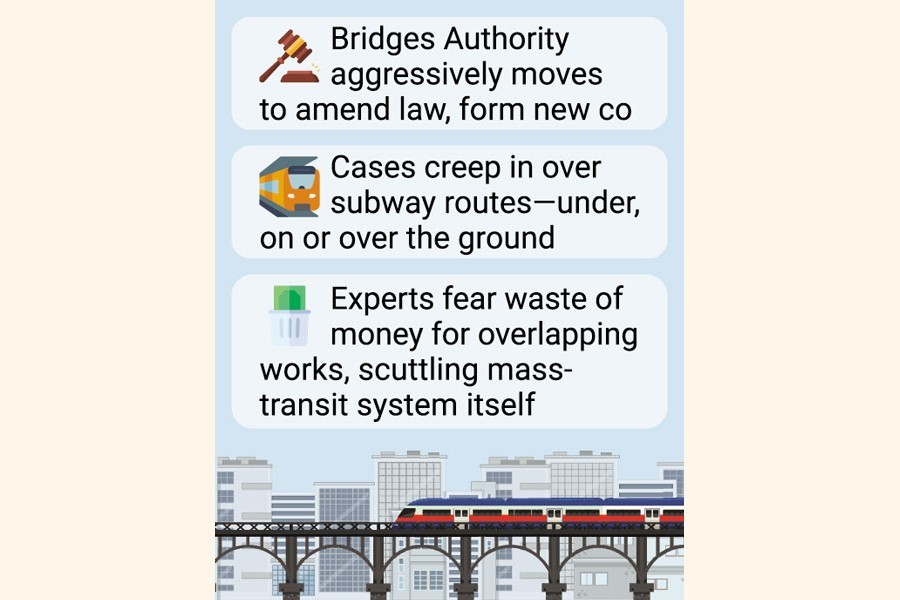Conflicts of authority between two government agencies are likely to embroil Dhaka's mass-transit-system development as Bangladesh Bridges Authority (BBA) moves to take subway construction in the capital under its jurisdiction, sources say.
Despite a dedicated authority being there to develop six metro rails in the city, they say, BBA is going to amend its act to incorporate subways under the purview of their rule of business.
In a step forward under the BBA move, a plan to form a Subway company has also been taken.
Experts say subway and metro rail which is known as Mass Rapid Transit (MRT) are both train-based mass-transit system and need similar expertise, skills and manpower to plan, construct, operate and maintain.
They think the two similar companies would create redundancy not only in manpower but also this will be waste of government funds and passenger will have to pay double fares in cases.
But a dedicated state-owned company -- Dhaka Mass Transit Company Limited (DMTCL) - has been created which has already been implementing six MRTs to develop more than128-kilometre lines engaging so far US$13 billion at investment stage since 2013.
The BBA was formed under an ordinance in 1985, which was later made an Act in 2016 vesting in it mandate for constructing bridges of 1.5 kilometres and above in size.
Later, the infrastructures like elevated expressway and river tunnel have been incorporated into its rule of business.
The inclusion of the subway now makes the BBA amend the act within five years of enactment.
Though subway was not its mandate by law, the BBA has also been conducting a feasibility study on development of subway network since 2019. According to draft report of the study, 11 routes will be developed in the city by 2030 at an estimated cost of US$ 32 billion.
Transport experts and consultants take exception to the move by the BBA as they think the diarchy would create "a new kind of conflicts among agencies and a bad culture in mass-transit-system development".
"Mass-transit system is now the last option for easing the city's chronic traffic congestion and two companies with similar job would damage last hope for the city," they point out in a common view.
The BBA and Roads and Highways Department (RHD) often lock in conflicts in construction of bridges of their respective limit. Cases were also there on construction of expressway after the RHD planned to develop expressway both on and above the ground.
MRT consultant sources said there are hardly two or three cases of two companies formed to operate metro rails or subways in a city.
They say this mass-transit system has been under operation in 200 cities in the world and the cities run those under two companies when the number of lines is more than 15/16 and one company could not run it efficiently.
They also say DMTCL has been planned to be empowered with over 1900-strong manpower to do its massive works.
Prof Mohammad Shamsul Hoque of Civil Engineering Department of BUET also says mass-transit system-be it above ground or below--is a transit development and it should be under one authority.
"DMTCL mandate is detailed and huge…formed with a huge organogram to work all necessary works for metro network. So the formation of another company will create conflict and develop a bad culture, damaging the city's last hope of improving traffic system," Dr Shamsul Hoque said.
Prof Moazzem of the same department says subway is not bridge and its construction and operational system is also different from BBA's mandate.
"Subway is not a bridge, even its target group is different from the mandate of the BBA," he also says, as regards the conflicts of jurisdiction.
BBA officials, however, argue that as the MRTs could not be planned covering all areas in the city, the subway will help it develop the network.
They say the subway network will go through passage underground different lands, even buildings, but MRTs planned under the existing roads for which cannot cover many areas.
Dhaka Transport Coordination Authority (DTCA) which was formed to ensure integration of transportation system in the city is also critical of the move for taking forward the subway without including its option in the revised strategic transport plan--a 25-year-long plan for Dhaka and its adjacent areas.
DTCA Executive Director Khandaker Rakibur Rahman also told the FE that definition of metro rail and subway is more or less same and its work cannot be started without approval and getting license from the DTCA.


